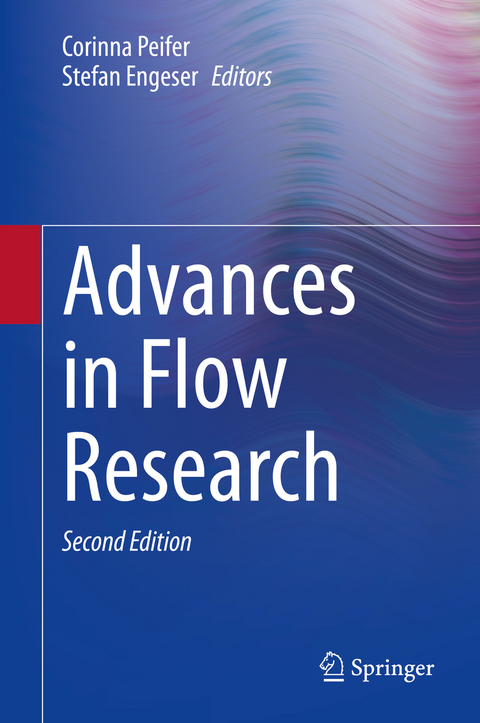
Advances in Flow Research
Springer International Publishing (Verlag)
978-3-030-53467-7 (ISBN)
This second edition provides a review of the current flow research. The first, thoroughly revised and extended, part of the book, addresses basic concepts, correlates, conditions and consequences of flow experience. This includes the developments of the flow model, methods to measure flow, its physiological correlates, personality factors involved in the emergence of flow, social flow, the relationship of flow with performance and wellbeing, but also possible negative consequences of flow. The second, completely new, part of the book addresses flow in diverse contexts, in particular, work, development, sports, music and arts, and human computer interaction. As such, the book provides a broad overview on the current state of flow research - from the basics to specific contexts of application. It presents what has been learned since the beginning of flow research, what is still open, and how the mission to understand and foster flow should continue. The book addresses researchers and students who are interested in flow, as well as practitioners who seek for sound research on flow in their field of expertise.
Corinna Peifer is Junior Professor for Applied Psychology in Work, Health, and Development at Ruhr-Universität Bochum, Germany. Her research is located at the interface between Work- and Organizational Psychology and Psychophysiology, and she is particularly interested in flow-experience and how it relates to stress and wellbeing. Corinna Peifer is founding member of the European Flow-Researchers' Network (EFRN), Country Representative Germany for the European Network for Positive Psychology (ENPP) and Vice-President of the German Association of Positive Psychology Research (DGPPF). Stefan Engeser is research assistant at the Friedrich Schiller University in Jena and is on training for clinical psychotherapist. His research interest in on learning and achievement motivation and individual differences in motive strength. As part of his research interest on motivation he is particularly interested in flow in achievement context and in daily life. He does research on flow for about 15 years and his interest in flow started when he was a Phd-Student of Falko Rheinberg (who was the first researcher on flow in Germany). His new interest is on clinical aspects of flow. How could flow be an explicit part of psychotherapy and a part to foster psychological well-being for subjects with mental disorders?
1. Historical Lines and an Overview of Current Research on Flow.- 2. On the Conceptualization and Measurement of Flow.- 3. Antecedents, Boundary Conditions and Consequences of Flow.- 4. Flow in Nonachievement Situations.- 5. Flow Theory and Cognitive Evaluation Theory: Two Sides of the Same Coin?.- 6. On the Relationship Between Flow and Enjoyment.- 7. The Dark Side of the Moon.- 8. The Psychophysiology of Flow Experience.- 9. Autotelic Personality.- 10. Social Flow.- 11. Flow in the Context of Work.- 12. Flow Experience in Human Development: Understanding Optimal Functioning Along the Lifespan.- 13. Flow in Sports and Exercise: A Historical Overview.- 14. Flow in Music and Arts.- 15. Flowing Technologies: The Role of Flow and Related Constructsin Human-Computer Interaction.- 16. Theoretical Integration and Future Lines of Flow Research.
| Erscheinungsdatum | 22.01.2021 |
|---|---|
| Zusatzinfo | XX, 453 p. 35 illus. |
| Verlagsort | Cham |
| Sprache | englisch |
| Maße | 155 x 235 mm |
| Gewicht | 871 g |
| Themenwelt | Geisteswissenschaften ► Psychologie ► Humanistische Psychotherapien |
| Geisteswissenschaften ► Psychologie ► Psychoanalyse / Tiefenpsychologie | |
| Studium ► Querschnittsbereiche ► Prävention / Gesundheitsförderung | |
| Sozialwissenschaften ► Soziologie | |
| Schlagworte | Concept of Flow • Conditions and Consequences of Flow-Experience • Developments of the Flow Model • Flow and Education • Flow and Human Computer Interaction • Flow and Motivation • Flow and Music • Flow and Optimal Experience • Flow and Sports • Flow in the Work Space • Methods Measuring Flow • Mihaly Csikszentmihalyi • Negative Consequences of Flow • Well-Being and Positive Psychology |
| ISBN-10 | 3-030-53467-7 / 3030534677 |
| ISBN-13 | 978-3-030-53467-7 / 9783030534677 |
| Zustand | Neuware |
| Haben Sie eine Frage zum Produkt? |
aus dem Bereich


